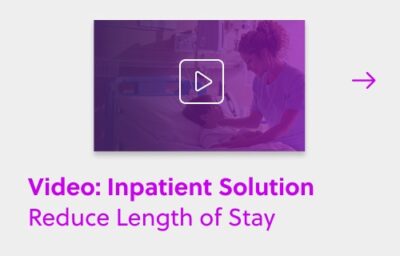Healthcare, by nature, is very reactive. A patient may experience a symptom, a malady, or an accident, and the care team responds appropriately. But when you look closely at the operational path to delivering care – specifically, the sequence of care events, resources required, and workload on the system – you see patterns that are remarkably consistent. In fact, for the vast majority of patient encounters, the steps in care are quite predictable and can therefore be streamlined. The application of artificial intelligence in conjunction with decision science is making it possible for hospitals across the country to quickly anticipate, identify and ultimately execute real-time operational improvements to alleviate bottlenecks in the care process.
Healthcare Today is Reactive
In treating patients, particularly in the emergency department, rapid assessment and delivery of care is critical. A patient must be triaged, get a diagnostic workup and move on to treatment as quickly as possible. For anyone who has visited an Emergency Department (“ED”), it is no surprise that this process can often be inefficient. These inefficiencies usually arise not out of any fault of the caregivers, but because it is difficult for an individual to see the complete picture of what’s going on in other parts of the care team, hospital or environment. Hospitals have begun using dashboards to give staff some data-driven insights to better inform them of general trends that may not be immediately obvious, such as slowdowns in other areas of the hospital.
Not surprisingly, however, clinicians rarely have time to explore dashboards. This is especially true in a fast-paced environment like an ED. Even given access to the information, do we really want nurses and physicians stepping back from patient-facing activities to spend hours pulling reports or printing out dashboards? Or can an intelligent system help them improve day-to-day operations without sifting through mounds of data?
This is where artificial intelligence can make a measurable impact.
Forecasting Demand to Reduce Delays
Nurses, physicians and staff diligently document massive swaths of data every day into EMRs. Most of this data is rarely viewed again (which, as a clinician, I might find a little frustrating), but machine learning tools can be applied to this corpus of data to generate meaningful insights and to alleviate some of the data burden on front line teams. Intelligent systems using Artificial Intelligence (AI) can scour this data to find patterns that can indicate where a process is breaking down. For example, in today’s hospitals, a telemetry bed might get an expedited cleaning only after a patient in the ED has admit orders and has been ‘boarding’ for some time. But why do these actions have to happen in sequence rather than in parallel? Could we have forecasted that the patient, a 72 year old male with a history of cardiac issues and abnormal troponins, was going to need that bed several hours earlier? And if this is possible, why not pass that insight along to front line staff in the ED, EVS and bed control to get the bed ready sooner? This is how a predictive use of data can help a hospital be proactive in expediting care. The result is a better patient experience and a process that is smoother for the staff tasked with executing it.
Arming Providers with the Right Information
To be sure, the world is not 100% predictable, and neither is our health. We will never be able to fully anticipate illness and injuries; but when a patient encounter triggers a cascade of events that has been repeated thousands of times before, why would we not try to bring the full benefit of that data to bear to ensure that each step comes right on cue? This is where we can begin to control how healthcare is delivered in a way that relieves cognitive load and frustration from frontline staff.
Taking into account contextual insights that may not be obvious to frontline teams augments their intelligence, allowing them to make the right decision for their patients with a more complete set of information. Healthcare continues to be one of the most complicated – and costly – industries around the world. AI can provide timely insights to ensure patients are cared for in the most efficient way to improve the total patient journey.


